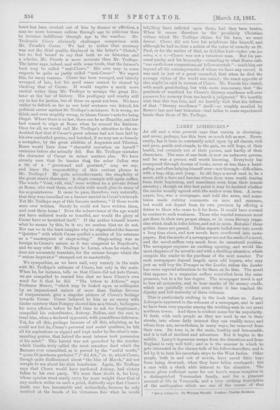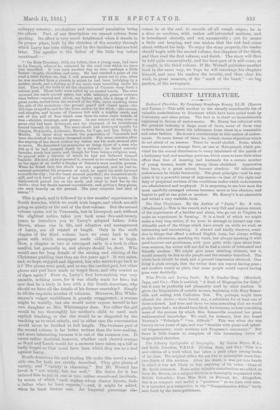LARRY LOHENGRIN.* AN old and a wise proverb says that
variety is charming ; and never, perhaps, has this been so much felt as now. Never, surely, has it been so constantly acted upon by all classes, rich and poor, gentle and simple, to the gain, we will hope, of their health, but certainly not of their purses, and hardly of their characters. The man of one book is now an unknown person, and be was a person well worth knowing. Everybody has scampered through dozens of books, never at lees than a hand- gallop, and often helping himself over—not through—difficulties,. with a hop, skip, and jump. In old days a novel used to be a novel, with a hero and heroine whose lives were worth tracing from their beginning, and sometimes even from their remote
ancestry ; though on this last point it may be doubted whether the reader usually agreed with the author even then. A news- paper, too, was a newspaper, and told the news, and some- times made cutting comments on men and manners,. but would not depart from its own province by offering a fiction to those who came to it for facts. It would have scorned to confess to such weakness. Those who wanted romances must get them in their own proper shape, or in some literary maga- zine which dealt in belles tett i'68, and not in news. But alas ! those golden times are passed. Police reports boiled over into novels a long time since, and now novels have overflowed into news- papers. But the needs of a newspaper are not the needs of a novel, and the novel suffers very much from its unnatural position. The newspaper requires an exciting opening, and would like most chapters of its novel to end with a thrilling situation, which compels the reader to the purchase of the next number. For such newspapers depend largely upon odd buyers, who may just as well buy the Trumpet as the Leader, unless the Leader has some especial attraction to fix them on its lists. The novel that appears in a magazine suffers somewhat from the same pressure, but in a far less degree. The newspaper novel is apt to lose all symmetry, and to bear marks of its uneasy cradle, which are painfully evident even when it has reached the dignity and full maturity of three volumes.
This is particularly striking in the book before us. Larty Lohengrin appeared in the columns of a newspaper, and is said to have been very popular among the working-men in our great northern towns. And there is evident cause for its popularity. It deals with such people as they are used to see in their streets, into whose daily interest they can readily enter, and whose lives are, nevertheless, in many ways, far removed from their own. Its tone is, in the main, healthy and honourable, and it is fall of incident and adventure. But it begins in the middle. Larry's ingenious escape from the detectives and from England is very well told ; and so is the manner in which he gets interested in the chance-talk of his fellow-travellers, and is led by it to turn his uncertain steps to the West Indies. Other people, both in and out of novels, have saved little boys from being drowned, when they have fallen overboard ; but a race with a shark adds interest to the situation. The rescue gives sufficient cause for our hero's warm reception in a distinguished Venezuelan family, and for a pleasant account of life in Venezuela, and a very striking description of the earthquakes which are one of the curses of that
• Larry Lohengrin. 13y WBIlem Westall. London Tinsley, Brothers.
unhappy country ; revolutions and universal peculation being the others. Part of one description we cannot refrain from quoting. Its effect is very much heightened when it stands in its proper place, both by the sketches of the country through which Larry has been riding, and by tho incidents that are told later. The speaker is the father of the little boy before mentioned :—
On Holy Thursday, 1812, my father, then a young man, had been to La Ousyra, whence he returned by the road over which we have just travelled. It was such another day as this—perhaps a little hotter—bright, cloudless, and calm. He had reached a point of the road a little farther on, that I will presently point out to you, when he was startled from a reverie in which he had been indulging by a sudden shook, and a feeliug as if the earth were trembling under his feet. Then all the bells in all the churches of Caracas rang forth a solemn peal. Those bells were tolled by no mortal hands. The next moment the earth moved again, but with infinitely greater violence than before—moved and 8hook, my father said, like a thing of life ; great rocks, hurled from the summit of the Silk, came crashing down the side of the mountain—the ground gaped and closed again—the hill-tops swayed to and fro like trees shaken by the wind,—the towers, and steeples, and houses of Caracas fell with a mighty crash, and out of the pall of dust which rose from its ruins came sounds of woe—shrieks, weepingss and groans. In one minute all was over—a great city had been destroyed, and ten thousand of its inhabitants buried beneath its walls. The same shock had destroyed equally La Guayra, Muyquetia, Antimano, Basuto., La Vega, and San Filipo de Merida. Jo those sixty seconds the population of Venezuela had been diminished by twenty thousand soula. For some minutes isfter the staying of the shock neither my father nor his mule seemed able to move. Ho described his sensations as being those of a man who felt as if he had escaped death by a miracle ; he dared scarcely breathe, much less move, and, though far from being a religious man, he prayed with a fervour of which he had not believed himself *capable. His soul, as he expressed it, seemed to be crushed within him at the sight of so awful a display of Nature's most terrible powers. When he found that the shock was not repeated, and be had re- covered somewhat his presence of mind, he urged his mule forward towards the city g but the boast seemed petrified ; she remained stock- still, and took heed neither of her rider's voice nor his spurs. He dismounted, patted her on the neck, and tried to lead her by the bridle ; then her flanks heaved convulsively, and, giving a deep groan, she sank heavily on the ground. The poor creature bad died of terror.' "
This is good, and is followed by a few months' experiences in South America, which we could wish longer, and which are still going on quietly at the end of the first volume. But the second volume opens, not in Venezuela, but in Liverpool, and, without the slightest notice, takes you back some five-and-twenty years, to introduce you to Larry's adopted father, John Brown, whose rise in life, and adoption and management of Larry, are all related at length. Only in the sixth chapter of the third volume have we come back to the point with which newspaper needs obliged us to begin.
'Now, a chapter or two of retrospect early in a book is often needful, but generally is, and always should be, short. Who
would care for long details of the mixing and stirring of the Christmas pudding that they ate five years ago? It was eaten, and, we hope, enjoyed and digested, but who wants to go back to it P The plums were good, and so was the candied peel, but other plums and peel have made us forget them, and why remind us
of them again P Even so, Larry's first love-making was very amiable, nothing more, for it was chiefly made for him ; but now that he is truly in love with a fair South-American, why should we have all the details of his former courtship P Simply to fill the requisite number of columns. Moreover, Mrs. White- mayne's vulgar worldliness is greatly exaggerated ; a woman might be worldly, but she would never expose herself to her own daughter as Mrs. Whitemayne does. For either the girl would be too thoroughly her mother's child to need such explicit teaching, or else she would be so disgusted by the teaching as to rebel utterly, and in either case the conversation would never be finished, at full length. The business part of the second volume is far better written than the love-making, and more interesting, because it is out of the common run. It seems rather doubtful, however, whether such shrewd scamps as Boyd and 'Leech would for a moment have taken up a bill so badly forged as that must have been which they use as a tool against Larry.
South-American life and trading life make this novel a read- able one, for both are vividly described. They give plenty of variety, and variety is charming." But Mr. Westall has laved it " not wisely, but too well." His desire for it has
induced him to put in one or two rather sensational incidents,
by means of which "each orphan whom chance directs, finds a father when he least expects,"—and, it might. be added,
when he least desires one. An Imperial personage also
comes in at the end, to smooth off all rough edges ; he is a deus ex machine, with rather self-interested motives, and is introduced cleverly, and not unnaturally ; yet he seems a little out keeping, and one wishes that the end had come about without his help. To enjoy the story properly, the reader should begin with the second volume, five chapters of the third, and then read the first volume, and finish. The story will thus be told quite consecutively, and the best part of it will come, as it ought, in the third volume. If Mr. Westall publishes another book in the same way, we hope he will rearrange his chapters himself, and save his readers the trouble, and thus clear his work, in great measure, of the "mark of the beast,"—we beg pardon, of the newspaper.



































 Previous page
Previous page